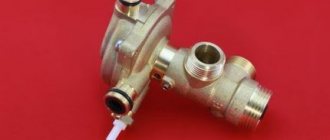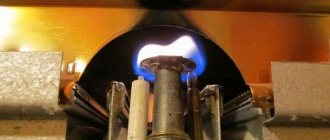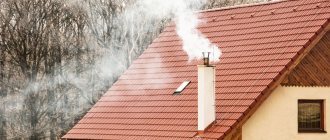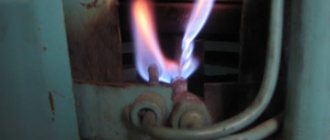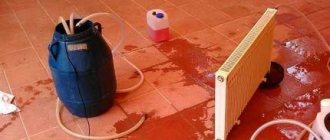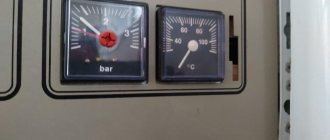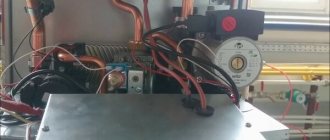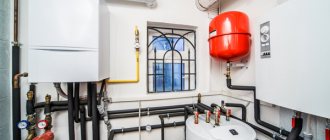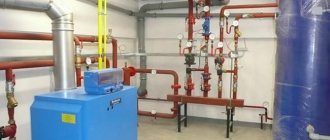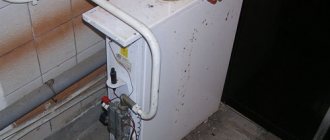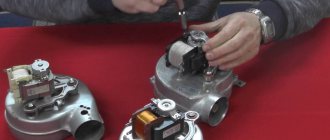Incorrect operation of a gas boiler is a sign of equipment malfunction. This fact should not be ignored. Especially if there is a popping noise when you turn it on. There are several reasons why this phenomenon occurs. It is not always possible to solve the problem yourself. Therefore, it is worth understanding why the gas boiler slams loudly when turned on and how to act in such a situation.
We recommend reading: Why a gas boiler does not work, the main causes of malfunctions.
Why does the boiler slam when turned on, reasons
The principle of operation of the boiler is based on the fact that upon startup, the gas supply to the burner begins. The igniter is triggered, causing ignition. The water is heated and supplied to the tap. If the tap is closed, the burner will go out. It is during ignition that you can hear a popping noise. This may indicate a serious hardware malfunction. Therefore, you should take a closer look at the possible causes of the clap of a gas boiler or water heater.
Insufficient traction
The chimneys of gas boilers are designed to dispose of combustion products generated during boiler operation. During normal operation the process is smooth and natural. In cold weather, carbon dioxide and steam cool faster than they reach the end of the pipe. This causes them to fall back down. This is how combustion products end up back in the equipment.
This mixture can clog the chimney, especially if its condition is not monitored. Debris from outside may get into the hole. The chimney can become so clogged that it is impossible to clean it yourself and you have to turn to specialists.
Blockage in the chimney
The above circumstances provoke a deterioration in traction, and the equipment begins to clap when turned on. This is one of the common reasons for the appearance of such sounds during ignition.
You can check the traction yourself. Just light a match and bring it to the chimney. With normal draft, the flame begins to lean towards the gas equipment. If the fire remains in the same position, then the combustion products are removed slowly, accumulate in the apparatus and the chimney needs to be cleaned.
Also read with this article: Reasons for a gas boiler blowing out
Sometimes popping noises occur due to a nearby hood. If it is equipped with a fan and works actively, it begins to draw in exhaust gas. Therefore, it is recommended to turn off the hood when the boiler is operating.
Weak draft is provoked by closed windows. This especially applies to metal-plastic structures. They deprive the room of sufficient fresh air, and the equipment cannot operate normally. It is recommended to open the windows at least slightly when using a gas appliance.
Low gas quality
The cause of the pop may be poor quality gas. It contains various impurities. They cause a sound similar to popping during ignition. If the quality of the fuel is low, all residents of the house will suffer from a similar problem.
Recommended reading: How to determine gas quality by the color of the flame
Therefore, it is enough to ask your neighbors. Perhaps they have the same problem. If not, then the problem is somewhere else. The appearance of pops in this case can be explained by the excess of various impurities in the gas. To solve the problem, it is recommended to contact the gas service.
Burner holes (nozzles) are clogged
The burner may become clogged due to combustion products. This may be due to the use of low-quality gas or incorrect settings of the combustion process. Also, a similar problem occurs with infrequent preventative maintenance. When a spark appears and a popping sound occurs, the problem is in a clogged hole near the igniter. The gas exits the far hole and creates an increased volume of the gas-air mixture. It accumulates and people hear a bang, turning on equipment.
You can clean the jets yourself if they are not very clogged. To do this, you need to partially disassemble the equipment and get to the burner hole. It is convenient to clean with a soft wire. There is no need to remove the jets. Additionally, it is worth cleaning the burner with a soft brush. If the problem was with clogged jets, the equipment will stop making noise after cleaning.
The gas appliance must be maintained annually. And it includes mandatory cleaning of the burner. Therefore, it is enough to apply for service to deal with the jets.
Read more in the article: Maintenance of gas equipment
Cleaning can be carried out regularly and independently, but it is worth remembering that any manipulations with gas equipment can lead to an emergency. Therefore, it is not recommended to do this without certain skills and knowledge. Clogged jets also cause problems with water heating.
Batteries are dead
The reason is banal, but quite common. Many people forget to change batteries. As a result, they begin to look for problems in various parts of the equipment, ignoring one of the most popular causes.
To achieve ignition, a gas appliance requires electricity. He can get it from batteries. While they are new, ignition is literally instantaneous. But when the batteries have already lost some of their charge, the ignition process becomes slower and a slight pop may occur.
The less electricity the device receives, the slower it turns on or stops working altogether. Fuel continues to flow, gas accumulates. The work area is completely filled with it. As a result, a deafening bang is heard. If the gas equipment does not light up when you turn on the water, you must immediately close the tap. The longer it is open, the more gas will accumulate in the work area.
The problem can be solved by replacing the batteries. If they were the reason, after changing them the equipment begins to work properly. It is recommended to use alkaloid batteries from trusted manufacturers. They will last longer, making the use of the boiler safer. Cheap options lose charge faster and have to be replaced more often, which does not lead to the desired savings, but, on the contrary, to unnecessary expenses.
The casing is deformed
During operation, the gas boiler regularly cools and heats up. There is a thermal effect on the casings. Because of this, they may become deformed. If the casing is damaged inward, then the spark plug begins to pierce the boiler body. When the deformation is concave, this part should be slightly bent.
Why does the gas water heater turn on with a bang?
There are two basic designs of gas water heaters:
- The first ones have a constantly working igniter that ignites the burner.
- The latter turn on automatically when the hot water tap is opened.
A strong bang when the gas water heater is turned on (more common in water heaters with a constantly burning pilot light) indicates a serious malfunction. A breakdown has dangerous consequences and can lead to an explosion and an emergency.
What is the cause of popping noises in the column and how to eliminate them
The operating principle of a gas instantaneous water heater is as follows:
- gas is supplied to the burner;
- with the help of an igniter or a piezoelectric element, the gas-air mixture is ignited;
- circulating water in the coil above the burner is heated and supplied to water collection points;
- After closing the tap, the burner goes out.
Cotton occurs due to the fact that during ignition, a large volume of gas accumulates in the combustion chamber before ignition. Unpleasant sounds indicate serious problems in the operation of the water heater or related equipment and smoke removal system.
Traction problems
Poor draft is one of the main reasons why the gas water heater slams when turned on. If the chimney channel is in normal condition, after starting the gas, its excess is simply removed from the combustion chamber through natural air circulation. Checking for traction is quite simple.
There are special holes in the column casing. To verify the presence of normal traction to the channels, you can:
- place your palm;
- lean a sheet of paper;
- bringing a burning match to the flame will deviate to the side, and not just tremble slightly.
Insufficient air circulation occurs due to blockage of the smoke channel with soot, dust and dirt, and the collapse of part of the brickwork. Malfunctions in an apartment building are repaired by the housing office; there is usually a stove maker on staff, or a contracting company that has entered into a service agreement with the residents.
Low batteries or faulty power supply
If a pop occurs when starting a gas water heater, after the igniter has been activated for a long time, the reason most likely lies in the following:
- Dead batteries mean there is no stable spark. Repair: installation of new batteries.
- Problems with microswitch - the module is connected to the control unit. It is this part that is responsible for the signal that the water is turned on and the burner needs to be ignited. The main cause of the malfunction: oxidized contacts. Repair: replacement of the microswitch.
You should not immediately call a technician if the dispenser starts slowly, accompanied by popping noises. First you need to replace the batteries. In approximately 80% of cases, the water heater will work normally.
Problems with the jet
A malfunction is indicated not only by popping noises when the gas water heater is turned on, but also by the intensity of burning of the pilot wick. The flame usually does not reach the edge of the burner, or sharply deviates at the top. The reason is insufficient gas pressure supplied to the igniter.
Fault catalyst: clogged jets. It is enough to clean the outlet holes on the burner and igniter and the column will continue to operate as normal. When performing maintenance, do not unscrew the jets. Cleaning is performed with a special awl with a rod identical in size to the outlet hole.
Lack of indoor air
The problem arises after installing metal-plastic windows. PVC windows are completely sealed and prevent normal air circulation in the kitchen. As a result, due to a lack of oxygen, a popping sound is heard when the gas water heater is turned on.
Another problem is related to the fact that when installing a door to the kitchen, SNiPs are violated. The door leaf is adjacent to the lower threshold, preventing the flow of fresh air.
Solution to the problem: installing supply valves on a metal-plastic window. There are special ventilation grilles for sale for installation on the door leaf. After the necessary air circulation in the room is restored, the column will begin to work without failures.
According to SNiP, at the bottom of the door leading to the kitchen with an installed gas water heater, it is necessary to provide a gap of 5 cm between the floor and the panel.
Incorrect igniter position
Problems when igniting a gas water heater occur when the spark plug is incorrectly positioned (automatic heaters). The igniter slides down under the influence of thermal deformation, as a result of constant heating/cooling. The optimal distance between the candle and the burner is 4-5 mm.
It is not difficult to adjust the igniter yourself. The spark plug is attached to the water heater body with just one bolt.
Causes of noise in heating equipment
The new gas boiler operates virtually silently. However, over time, the unit begins to make noise.
This is a sign of hardware failure:
- scale formation;
- the fan has failed;
- wear of device components;
- manufacturing defects;
- incorrect settings or installation of the boiler.
To understand why a gas boiler makes loud noise, you need to listen to the noise the equipment makes.
If the hum is heard directly from the boiler, then you should check the water level and add it if necessary. If noise is heard from radiators or piping, then air has entered the system and must be removed. Extraneous noise in the pump itself indicates a manufacturing defect.
Clicking sounds that occur at short intervals indicate problems with the fan. If the boiler hisses or whistles, it means that a lot of scale has accumulated in the device
If the circulation pump breaks down, this element often needs to be replaced. The gas supply to the system must be adjusted from time to time. High pressure is undesirable.
Problems with the exhaust fan
If extraneous noise occurs at intervals, you should check the fan. Its task is to systematize the operation of the smoke removal system, due to which combustion products are removed from the boiler with the intensity necessary to ensure the complete safety of others.
The fan blows through the system, clearing it of combustion residues, and also serves to remove smoke. The longer the boiler operates, the greater the fan wear
The main reason is age. Most likely, you just need to replace the fan with a new one. The second reason that leads to rapid wear of the cooler is its location above the burner at the top of the device.
Under constant exposure to high temperatures, the bearing lubricant quickly dries out, causing it to wear out. To fix the problem, you also need to replace the fan.
Another reason for the appearance of extraneous noise effects is that the part may be clogged with dust, to remove which you need to do the following:
- Inspect the fan. If necessary, it should be cleaned. The main blades are located inside the housing. You need to remove dirt and dust from them, and then lubricate the bearings.
- If the problem cannot be solved, replace the outdated valves with new ball valves.
- If the previous two steps did not bring results, reinstall the cooler.
It is better to entrust the replacement of parts to a gas boiler repairman from a service with which an agreement has been concluded for the maintenance of devices and the supply of blue fuel. Timely and competent replacement of worn parts will eliminate the need to buy a new unit.
Scale deposits on the walls of the heat exchanger
Thanks to the heat exchanger, heat is redirected from gas to water. If the water is hard, then scale may form in the heating system as it heats up. To remove mineral deposits deposited on the walls, it is recommended to regularly chemically flush the heating system and clean the heat exchanger.
A household chemical for cleaning the heat exchanger can be purchased at the store. Craftsmen often use 4% vinegar for these purposes. After cleaning, parts should be rinsed with water.
This problem is noticeable after 15-20 minutes from the moment the gas boiler is started. The reason for the sound is the narrowing of the passage for water. As a result, steam and small bubbles are formed. Scale reduces the efficiency of equipment, as well as its heat transfer and wear resistance.
You can descale the unit using chemicals containing soda and similar substances. You can do this yourself. To do this, remove the heat exchanger, remove the casing and unfasten all connected pipes. A special chemical solution must be poured into the device for 2-5 hours.
Lack of water in the heating system
If there is not enough water flowing through the heating system, the boiler begins to make noise due to overheating. This is because air pockets form inside, interfering with the normal circulation of fluid in the system.
Airing the system leads to incorrect operation of the boiler. If there is not enough water in the pipe section, an air lock will form. At the same time, the heating device partially cools down, and water cannot circulate normally in the system, so it overheats by the burner. At the same time, a dull whistle or howl is heard
Airing leads to the following problems:
- the circulation of water in the coolant decreases or stops;
- The boiler automatically turns off due to overheating of the coolant.
Reasons why air ends up in the heating system:
- violation of sealing during repair work;
- violation of the integrity of the system;
- drainage of water from the DHW circuit.
To make the device work, you need to adjust the thermostat. You also need to make sure that the thermostat is installed correctly, add water, and adjust its supply and circulation.
The Mayevsky valve, which is mounted at the end of the radiator, will help get rid of air in the system. It has a fitting that, when opened, allows access to the inside of the battery. The faucet is most often installed at the top of the device, where warm air accumulates.
You can also use an air separator. The device collects air that collects into bubbles as water flows along the circuit. When excess air has been completely removed from the pipes, replenish the coolant through the make-up tap and make sure that the boiler operates without any extraneous sounds.
Arranging a perfectly sealed heating system will prevent the accumulation of air in the coolant. This is troublesome and expensive, but it will eliminate the occurrence of extraneous noise in the gas boiler.
Consequences of low pressure
Reasons why pressure in the system may decrease:
- water leak;
- breakdown of the boiler expansion tank;
- long interruption in electricity supply;
- Incorrect setting of the gas boiler.
If the pressure in the system drops, the boiler begins to make loud noises. Your task is to first check if there is a leak in the heating circuit. A simple napkin will help you with this; use it to wipe all joints and joints. Once the source of the leak is discovered, it must be eliminated.
If the pressure in the system drops, the boiler stops working because it is blocked automatically. Lack of water in the heating circuit leads to overheating, it is detected by sensors, after which the boiler turns off automatically
The cause of pressure changes may be cracks in the expansion tank or heat exchanger. To identify their location, all water should be removed from the system, and then air should be pumped into it using a compressor. In places where microcracks form, air will leak out with a characteristic whistle. The appearance of microcracks indicates wear and the need for complete replacement.
This occurs as a result of frequent flushing of the system with chemical reagents, due to poor quality metal, a sharp increase in pressure in the line, and water hammer. If you can remove and repair the heat exchanger yourself, then you can try soldering the resulting microcracks.
To prevent such problems, it is recommended to regularly inspect the boiler, as well as install auxiliary equipment that will allow you to control the pressure by displaying the value on the screen. Standard pressure indicators are 1.5-2 atmospheres.
Incorrect unit setting
Incorrect adjustment or installation of equipment can also cause a valve or bypass to whine. Extraneous noise may occur as a result of improper load redistribution.
If the operating power of the unit exceeds the permissible values, vibration occurs as a result of excess pressure and the pump begins to rattle
If the sound of metal hitting metal occurs during heating or cooling, uncompensated heat expansion occurs in the device. The reason lies in incorrectly installed radiator mounting brackets.
If you don’t know why your gas boiler is constantly whistling, you should first check the settings. The rules and sequence of actions when setting up a gas boiler can be found in the technical documentation for the unit; operating parameters can be found on the nameplate attached to the equipment body.
When does the clicking occur?
How to understand why a gas boiler clicks? As a rule, clicks can be heard when turning a gas boiler on and off. And also during cooling and heating. Below are the most common reasons:
- During startup, a large amount of gas is generated. This gas flashes as soon as the device is turned on, causing us to hear noise.
- The cause of the extraneous sound may be a malfunction of the three-code valve or the ignition mechanism. Also, the reason may be hidden in a clogged chimney. This leads to the formation of a mixture of gas and air. A dirty wick is also accompanied by clicking noises. If the problem is not corrected, cravings will worsen over time.
- Due to incorrectly installed brackets, the balance of thermal expansion occurs. Because of this, blockages occur in the lower part of the boiler body, which can cause extraneous sounds. Often clicks can be heard when there is a large evaporation of liquid.
- There may be malfunctions in the operation of the pump itself; it is necessary to check it for any problems.
- A sharp drop in temperature in the boiler. The device cools down, making characteristic sounds.
- An extremely rare, but still possible cause of clicking sounds is improper installation of pipes.
Incorrect burner installation
Often the cause of noise, clicking or whistling is due to improper installation of the burner. To check, you will need to evaluate the level of gas pressure leaving the burner and the recommended indicators in the equipment instructions.
The appliance is noisy when heating water
Modern boilers operate silently, so vibration, noise, and other sounds are a cause for concern. Why does a gas boiler click? What could be the reason:
- Incorrect installation and configuration.
- The elements are simply worn out.
- Oxygen content exceeded
The water in the pipes is oversaturated with oxygen, so bubbles form when heated. This causes noise and vibration not only from the boiler, but also from heating radiators.
Air has formed in the system
If the boiler is knocking, it is necessary to bleed the air in the pipes. Modern batteries have taps installed. Air is released when the taps are unscrewed.
How to remove air from the battery yourself?
The accumulation of air in batteries after a break in the heating season is not a rare occurrence. This is a common problem not only in private homes, but also in apartment complexes. Its solution is not a complicated process. Heating batteries and radiators are equipped with Mayevsky taps. They are located on the side of the batteries. In appearance, most often they resemble a valve.
To bleed air from the battery, you need to:
- Prepare a cup or bucket for water that will flow from the tap when unscrewed;
- Open the tap and let out the air;
Attention! This must be done carefully, as there is a risk of getting burned by the steam!
- Tighten the valve after water flows from the tap.
.
Columns with ignition wick
Why the gas water heater turns on with a bang did not worry the owners of old water heaters too much. Their design and operating process were not as convenient when compared with modern equipment. But repairing them was much easier and cheaper.
In this case, a pop when the gas water heater is turned on is possible if the ignition wick is in the wrong position. The device bangs because the flame has decreased and cannot reach the edge of the burner. This is due to insufficient gas supplied to the wick. The main reason why a water heater makes noise is considered to be a clogged nozzle.
You can cope with this problem yourself, the main thing is to be able to completely disassemble the device. The design diagram of instantaneous water heaters is similar, so the instructions will fit each device.
To cope with a breakdown and prevent an explosion of a gas water heater, you must act in the following sequence:
- Shut off the flow of water and gas to the equipment.
- Dismantle the protective casing.
- Open access to the ignition wick.
- Unscrew the fasteners from the guide tube and remove the nuts securing the sensors and supply tubes.
- Pull the tee out of the groove.
- Pay attention to the lower pipe. A small screw with a hole through it will be visible at the bottom. It is called a jet.
- Remove the element from the tube and clean it thoroughly. To do this, you can use a thin wire and a needle.
- After completing the procedure, all parts must be put back together.
After completing these steps, the popping noise in the water heater should stop. Having found out why the gas water heater is noisy, you just need to fix the problem. If the breakdowns are complex and the noise in the device increases, you need to visit a specialist. He will do everything to ensure that the column does not explode and functions normally.
Boiler BAXI MAIN Four 24 loud popping noises when igniting
Support the project, share with friends!
Before the start of the heating season, the BAXI MAIN Four 24 boiler was installed. During operation, the following comments were revealed in the operation of the boiler:
1. instant heating of water in the heating system after igniting the burner by 8-10 degrees, as a result of which the boiler quickly turns off. The first few seconds the burner works very powerfully, then the flame is reduced to a minimum, and after working for even less than a minute it turns off. At the same time, the pump operates, maintaining circulation.
2. Quite often a gas explosion occurs in the combustion chamber, namely a very strong bang (in the dark, a flame is even observed above the boiler). In this case, the characteristic sound of the ignition electrode occurs. The chimney is not clogged. Open/closed transom does not change the situation.
The second point is especially puzzling. No additional adjustments were made to the boiler after installation. Heated 2-room apartment. The heating is made with polyethylene pipes d20mm.
Hence the question, what could be the reason(s) for the described comments?
I hope that I won’t get much from the administration and the inhabitants of the forum, I used the search, but did not find similar questions.
Only registered users can reply to topics and conduct full communication
User comments:
All about repair and construction:
Login via social networks:
Also, you can log into the site using the following social networks (without filling out personal data):
Authorization
Registration on the portal
Feedback
Fill out the required fields in the form below and click the “Submit” button. Try to state the essence of the issue and the purpose of the appeal as clearly and clearly as possible. This will speed up the processing of your request. After receiving the letter, we will contact you in a way convenient for you, at a time convenient for you. Thank you for your interest in our site.
Boiler BAXI MAIN Four 24 loud popping noises when igniting
Orders for apartment renovations, construction tenders. Private craftsmen and teams. Construction, finishing, renovation of apartments in Russia
Source: www.dkd.ru
#1 20-03-2013 14:34:28
Copper (mini explosion) when igniting
The boiler is 5 months old, in its first winter, I recently noticed that when ignited, the piezo crackles, the gas flow is clearly audible, sometimes it’s normal, and sometimes there’s a bang and it seems like the boiler will burst. what could it be? I didn’t notice this all winter, only when it started to get warmer outside, by the way I noticed that this mostly happens when the boiler temperature is 33-37 degrees (up to 40). I took off the combustion chamber cover and wiped the burners with a toothbrush, using a cloth, it seemed a little better, less often, but it still slammed.
The principle of operation of the stabilizer
Since only relays are capable of clicking in the stabilizer, it means that it is made according to a relay circuit. Each relay stabilizer has an autotransformer in its structure that increases or decreases the voltage based on the ratio of the turns of the windings. When the voltage value approaches the upper limit of the range, the device circuit switches to the autotransformer winding with a lower voltage value, and, as a result, the output voltage becomes lower. In the same way, this works in the opposite direction: when the voltage in the network deviates towards the lower threshold, the stabilizing device switches to the step-up winding of the autotransformer.
The process of switching the transformer windings is supervised by a special device - the stabilizer controller, and the switching is made through a set of power relays. It is these relays that, at the moment of connection, produce the very clicks that the user hears.
A standard stabilizer can contain from four to seven power relays. And the more voltage surges in the power supply network, the more often switching occurs and clicks are heard. Also, at these moments, the light may blink and highly sensitive equipment may turn off.
How does the scheme work?
The principle of operation of this circuit that prevents popping when the ignition is turned on is very simple. When the ignition is turned on, power is supplied to the contacts of 30 additional relays. The contacts are not closed, and the ignition module remains without power. When the starter is turned on, simultaneously with the windings of the solenoid relay, the electromagnetic coil of the relay receives power. It attracts the armature and closes contacts 30 and 87 of additional relay 2. Through these contacts, the electromagnetic coil of additional relay 1 receives power, which also closes the contacts, while relay coil 1 will receive additional power from contact 87.
After starting the engine and turning off the starter, the coil of additional relay 2 loses power and its contacts open. The additional relay remains turned on, since the coil is powered through its own contacts 30 and 87. In this case, a spark will form on the spark plugs only when the crankshaft rotates, preventing a gas explosion in the manifold.
Instead of additional relay 2, you can use a diode, and it does not require much power. If a module of type SOATE 2111.3705-03/0433705 with three wires is installed on the machine, and it is on them that the bang most often occurs, then its connection diagram is almost the same, only there is no negative wire from the module.
Reasons for the formation of sounds and pops
Sharp sounds and pops have the following causes:
- If the three-way valve is faulty, it makes a clicking sound every time it ignites and starts operating.
- A loud bang during startup indicates a malfunction of the ignition system. Perhaps the spark appears too late, when an excess amount of gas has already accumulated, which flares up sharply and pops loudly.
- The reason that the machine bangs when the flame lights up may be a clogged wick in semi-automatic models. This is also caused by poor chimney draft. The electrodes in devices with automatic ignition become dirty and may deviate from the correct position under the influence of temperature.
Semi-automatic boiler wick - Over time, the nozzles in the gas burner can become clogged, creating a poor gas-air mixture, resulting in noise when the fire is lit.
- Metallic knocking sounds occur if the radiator mounting brackets are not installed correctly. This happens when the heating system heats up and cools down due to uncompensated thermal expansion.
- A knocking sound occurs if pipes are installed in the wall without taking into account the degree of freedom of movement during thermal expansion. This is especially noticeable when turning the heating off and on, when the temperature of the coolant changes.
- A gas boiler explodes if the radiator fins are clogged.
- In some models of gas boilers, popping noises occur due to the fact that the mesh at the bottom of the casing is clogged. This leads to a decrease in traction.
- Also, if the pump operates unevenly and does not correspond to the nominal pressure and performance indicators, strange sounds appear due to the occurrence of resonance in the system.
Air shortage
In a kitchen with PVC windows, air circulates worse. This negatively affects the operation of the column. And when it is turned on, cotton appears due to a lack of air.
This dilemma also arises because of the door leaf, which fits tightly to the lower threshold.
It is necessary to install supply valves on the window.
It is also important to install special grilles on the door.
In accordance with SNiP standards, a gap of 5 cm should separate the kitchen door and the floor.
Excessive pressure in the heating pump
The pump provides high pressure; it is necessary to adjust its settings. Excessively high pressure in the system can provoke an emergency.
A low amount of water in the system may cause the device to overheat. Try lowering the thermostat. You may need to add water to the device to the required level.
Heating pump
- If the boiler seems to “howl”, the gas valve may be set incorrectly, check the jumpers.
- At high power, the source of extraneous sounds may be the gas meter.
- The valve was worn out and began to rattle. It needs to be replaced. If the problem is not solved and the boiler is still noisy, you can replace the valves with ball valves and install a rubber gasket.
- If the above measures do not help, you may need to replace the cooler.
Scale on boiler parts
Due to the fact that the water is not filtered before it hits the heating elements (read about choosing a filter for heating in a separate article), therefore sediment often remains on the internal surfaces of the gas boiler. Parts gradually lose their functionality. The problems start with the heat exchange elements. Further, sediment forms on the walls of radiators and pipes, this reduces the space through which water should flow. Getting rid of scale is quite simple; just open the gas boiler and clean it using special means. In this case, only the wear resistance of the equipment itself suffers. To avoid such problems in the future, it is enough to carry out periodic preventative cleaning.
Troubleshooting Methods
| Problem | What to do |
| Electric ignition is not working correctly. | It is prohibited to use a gas water heater. It is necessary to close the main gas supply valve, remove the batteries (to ensure that no one uses the faulty equipment) and call a specialist. |
| There is not enough electric ignition discharge. | Replace the batteries, turn on the column: if within 3-4 seconds the flame does not appear on the burner, turn off the gas supply tap to the column, remove the batteries, and call a technician. |
| Incorrect wick direction. | The column cannot be used. It is necessary to turn off the gas valve. In this case, it is necessary to clean the ignition group. This type of work should only be carried out by a competent specialist. |
Pump noise
A common cause of problems is pump operation. Typically, it has three positions to raise the water column to a certain height, which depends on the power of the device. The uniform movement of the coolant along the thermal circuit is not accompanied by noise effects.
If you hear strange sounds that sound more like mechanical sounds, you should check the operation of the pump.
In case of failure:
- water gurgles in the heating pipes of a private house;
- a hum appears;
- cracking is possible;
- The boiler begins to make noise and knock.
In this case, you need to turn off the pump, and if the sounds stop, then the reason has been found. Cracking and noise are mechanical damage: this means that the graphite sliding bearings have worn out or dirt has gotten into the housing.
Scale settles on the inner walls of the pump due to poor-quality coolant and has a destructive effect on its components.
Checking is simple:
- it is enough to remove the pump;
- lower its working part into a container of water;
- when turned on, it must pump water; if this does not happen, it must be repaired.
Important! The pump cannot be turned on without water.
#5 20-03-2013 20:13:38
Re: Pop (mini explosion) when igniting
1. Check the position of the electrode (gap: 3 mm) 2. Pressure for minimum power (mbar) – 2.4 3. Gas pressure for rated power (mbar) – 13.8 4. Unlikely. Most likely, we are talking about delayed ignition (ignition of gas), when there is already a lot of gas in the firebox.
“The dependence on the weather and on the set temperature to 38-40 degrees is confusing” - the ignition parameters do not depend on this. Further modulation of the boiler power will depend on them.
Prevention measures
If the boiler hums when starting up or turning on hot water, you must first make sure that there is a sufficient level of liquid in the system and, if necessary, top it up. If sounds are coming from radiators and pipelines, it means that air pockets have formed in them, which should be removed. If the pump knocks or whistles, it is most likely a manufacturing defect: you will have to install a new working unit.
An effective preventive measure is timely removal of scale from the heat exchanger. It is also important to monitor the gas supply so that the pressure does not build up too high.
The culprit is the jet
Why does a strong bang occur when the gas water heater is turned on, and the ignition filter burns intensely?
These are signs of a problem with the jet. The fire does not reach the extreme side of the burner or quickly deviates at the top.
This means that the gas enters the igniter with very low pressure.
A decrease in its pressure is due to clogged jets. Clean the outlets on the ignition element and burner. Do not unscrew the jets.
For the procedure, use a special awl with a rod whose dimensions correspond to the parameters of the outlet hole.
Causes of extraneous noise in various models
Why does the Navien gas boiler click regularly? There are two possible reasons: scale formation and problems with the coolant.
How to fix the problem yourself:
- disassemble the device;
- clean or replace the heat exchanger;
- check the taps;
- reduce the water temperature.
Extraneous noise is also observed during operation of Beretta brand gas boilers.
Typical reasons:
- poor heat transfer in the heat exchanger, scale formation;
- Wrong pipes are connected.
Why does the Concord gas boiler whistle? The most common reason is increased load in cold weather. The boiler power declared by the manufacturer does not correspond to reality and in practice the figures are lower.
For example, if the documentation indicates 13 mbar, then in reality it is 10 mbar. The device should not be set to maximum.
It is recommended to clean your gas boiler at least once a year. For this purpose, you can contact a service center or carry out the procedure yourself.
In a Baxi gas boiler, noise occurs most often when the heating function is turned on. To identify the cause, the bypass should be checked, and the valve should be cleaned and adjusted. Users of AOGV devices often complain about whistling. The cause is scale and a clogged filter.
Vailant boilers hum after turning on the heating function and turning off the fire. The first reason is that the heating circuit strainer is clogged; cleaning it will correct the situation. The second reason is a malfunction of the valve on the bypass line. Adjusting the valve will help solve the problem.
The cause of noise in Ariston boilers is poor coolant circulation. The problem will be solved by blowing the heat exchanger with a compressor. If the Ardelia gas boiler is humming, you should check that the pump settings are correct. If the situation cannot be corrected in this way, then it is recommended to replace it with a new circulation device.
Diagnostic methods
You can try to determine why the gas water heater slams when you turn it on yourself. The owner must follow the instructions exactly. To diagnose the problem, it is necessary to check the chimney draft intensity.
The gas column has a casing with a hole, which is intended specifically for testing. If this hole was not provided during the production of the model, inspection is carried out through a slot located at the chimney hood. You can also feel the draft at the hatch through which the chimney is cleaned.
Often the verification procedure is performed using a lit candle. It must be brought to the hole and observed how the flame behaves. If the fire deviates to the side, then everything is fine with the draft; if there are weak fluctuations or their complete absence, a problem with the chimney and poor draft can be suspected. If there is no traction, then the light burns evenly. This means that the chimney is clogged. In this case, you cannot use the device, as the gas water heater may explode.
Most often, it is precisely when there are problems with traction that the column squeaks, clicks or hums.
The reason for this is:
- Blocked. If debris gets into the chimney and soot accumulates, this will gradually clog the passage. When the column bangs, the hole should be cleaned. You can do this yourself if the contamination is shallow. Otherwise, you need to turn to the help of utility services;
- Poor ventilation. When installing plastic double-glazed windows, natural ventilation is disrupted. Sufficient air is required for normal draft, otherwise the heater ignites with a delay;
- Strong hood. An excessively intense fan delays the exhaust and does not allow it to rise up. What to do in this situation is of interest to all equipment owners. It is enough to simply turn off the hood for the period when the equipment is working.
The gas boiler hums and whistles
A gas boiler can make noise throughout the entire apartment, thereby interfering with sleep. Is it possible to get rid of this noise? In fact, the cause of the noise lies in the chimney. In this case, the chimney needs to be enlarged and expanded. The narrower it is, the stronger the rumble.
Operating principle of combined heating boilers
Often the gas boiler begins to hum loudly. The reason is the stabilization system, which regulates the level of gas pressure that enters the combustion compartment. To prevent sounds from interfering with a comfortable existence, it is better to locate the boiler room away from the living space. If it has already been built next to your home, you can solve the issue by ensuring soundproofing of the room. There are a great variety of materials for this.
If the boiler starts to boil like an electric kettle, it means the primary heat exchanger is clogged. Finding out whether there is a blockage is quite simple. You need to set the boiler to the maximum temperature and turn on the supply valve so that there is a small flow of water. At around 80 degrees the hum increases. There is only one way out - clean the heat exchanger.
Knocking in boilers and pumps
Boiler equipment used to equip heating systems can operate on various types of gaseous, liquid or solid fuel, or also on electricity. However, the operation of boilers of any type may be accompanied by certain side processes, which often affect the heating system and can cause noise in it.
In particular, wood or coal solid fuel can lead to clogging of the chimney with a decrease in draft force. The operation of boiler houses using liquid diesel fuel may be accompanied by incomplete combustion and accumulation of soot. All this often leads to noise and humming in heating communications, and requires measures to eliminate these problems.
Noise may also appear due to malfunctions of pumps, valves or other devices and mechanisms located in the boiler room or basement. The solution to the problem in such situations is to repair faulty elements or replace them.
In general, any specific situation with the occurrence of noise in the heating system requires an individual approach, and there cannot be universal methods here. In some cases, identifying and eliminating faults on your own can be very difficult, and in this situation, the only way out of the situation is to contact qualified specialists.
And the neighbors are noisy too
More often than not, it's not just you and your family who suffer this. Therefore, you first need to go around the neighbors along the riser to identify the location of the noise.
Let's find out where the pipes are making noise
Now, as for the nature of the buzz. Heating pipes, like water pipes, can emit single or rhythmic sounds, something like tap dancing, rustling, gurgling, or even generally vibrate and even hum – periodically or constantly. The reasons can be completely different, they are even classified into groups. But now we will not consider absolutely all of them, but will focus only on impact noise effects.
Note: The likelihood of noise in pipes is sharply reduced if you use metal-plastic or plastic pipes instead of metal and copper. This is explained by the high sensitivity of steel pipes to low-frequency vibrations and high rigidity. Although their material is much stronger. It is recommended to use ball valves rather than screw valves as shut-off valves, which are controlled by turning the handle. These are heavy cast copper products, not Chinese-made products made from light alloy material.
